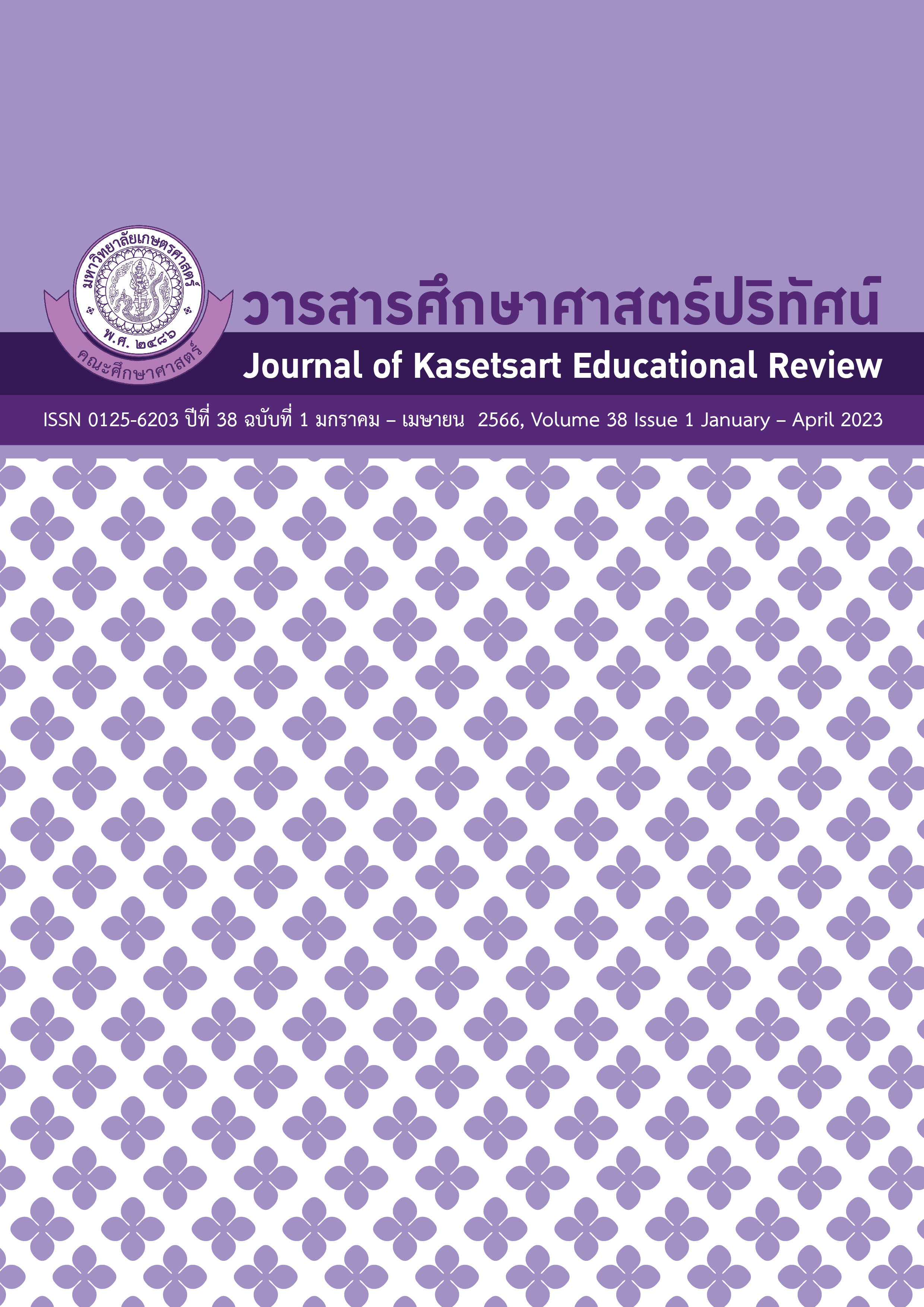บทบาทของ Minecraft: Education Edition (M:EE) ต่อการพัฒนาการเรียนรู้: การทบทวนวรรณกรรมอย่างเป็นระบบ
คำสำคัญ:
มายคราฟ, คอมพิวเตอร์ศึกษา, การทบทวนวรรณกรรมอย่างเป็นระบบ, เมตาเวิร์ส, การเรียนรู้โดยใช้เกมเป็นฐานบทคัดย่อ
การวิจัยนี้มีวัตถุประสงค์เพื่อสังเคราะห์บทบาทของ Minecraft: Education Edition (M:EE) ที่มีต่อการพัฒนาการเรียนรู้ของผู้เรียนโดยใช้ การทบทวนวรรณกรรมอย่างเป็นระบบ กลุ่มตัวอย่าง ได้แก่ งานวิจัยที่ตีพิมพ์ระหว่างปี พ.ศ. 2559-2566 ในฐานข้อมูล EBSCO, ERIC และ Scopus เครื่องมือวิจัย ได้แก่ แบบคัดกรองงานวิจัย แบบประเมินคุณภาพงานวิจัย และแบบบันทึกการสกัดข้อมูล วิเคราะห์ข้อมูลโดยใช้สถิติเชิงพรรณนาและการวิเคราะห์เนื้อหา เกณฑ์การคัดเลือกงานวิจัยคือ เป็นงานวิจัยเชิงทดลองหรืองานวิจัยกึ่งทดลอง ใช้แพลตฟอร์ม M:EE เพื่อพัฒนาการเรียนรู้ และระบุกลุ่มผู้เรียนเป้าหมายไว้ชัดเจนจากการสืบค้นพบงานวิจัย 64 เรื่อง มีงานวิจัยที่ผ่านเกณฑ์ 14 เรื่อง ผลการวิจัยพบว่า แพลตฟอร์ม M:EE สามารถใช้กับกลุ่มผู้เรียนในทุกระดับการศึกษา กลยุทธ์การสอนหลักคือการเรียนรู้โดยใช้เกมเป็นฐานแต่สามารถบูรณาการกับการสอนรูปแบบอื่นได้ เนื้อหาส่วนใหญ่อยู่ในรายวิชาคอมพิวเตอร์และวิทยาศาสตร์ และยังสามารถใช้สอนในอีกหลากหลายวิชา ด้านผลการเรียนรู้นั้น M:EE ช่วยพัฒนาผลสัมฤทธิ์การเรียนรู้ของผู้เรียนไปในทิศทางบวกในทุกวิชาและช่วยส่งเสริมการพัฒนาทักษะกระบวนการที่สำคัญสำหรับผู้เรียนได้ดี
เอกสารอ้างอิง
Baek, Y., Min, E., & Yun, S. (2020). Mining educational implications of Minecraft. Computers in the Schools, 37(1), 1-16. https://doi.org/10.1080/ 07380569.2020.1719802
Bar-El, D., & Ringland, K. (2021). Teachers designing lessons with a digital Sandbox game: The case of Minecraft: Education Edition. European Conference on Games Based Learning; Reading (pp. 811-832). Web of Science Conference Proceedings Citation Index. https://doi.org/10.34190/GBL.21.135
Bile, A. (2022). Development of intellectual and scientific abilities through game-programming in Minecraft. Education and Information Technologies, 27(5), 7241–7256. https://doi.org/10.1007/s10639-022-10894-z
Burden, K., & Kearney, M. (2016). Future scenarios for mobile science learning. Research in Science Education, 46(2), 287–308. https://doi.org/10.1007/s11165-016-9514-1
Callaghan, N. (2016). Investigating the role of Minecraft in educational learning environments. Educational Media International, 53(4), 244–260. http://dx.doi.org/10.1080/09523987.2016.1254877
Cole, T., & Shifflett, J. (2022). Doctoral colloquium: building intertextual connections with secondary students in Minecraft. 8th International Conference of the Immersive Learning ResearchNetwork (pp. 1-3). Scopus. https://doi.org/10.23919/ iLRN55037.2022.9815903
Cózar-Gutiérrez, R., & Sáez-López, J. M. (2016). Game-based learning and gamification in initial teacher training in the social sciences: an experiment with MinecraftEdu. International Journal of Educational Technology in Higher Education, 13(2), Article 2. https://doi.org/10.1186/s41239-016-0003-4
Demirkiran, M. C., & Hocanin, F. T. (2021). An investigation on primary school students’ dispositions towards programming with game-based learning. Education and Information Technologies, 26(4), 3871-3892. https://doi.org/10.1007/s10639-021-10430-5
De Weck, O., Feiler, J., Tan-Tiongco, K., Rahaman, R., & De Weck, C. (2022). Minecraft design build: Teaching teamwork and project planning in a virtual world. 2022 ASEE Annual Conference & Exposition (pp. 1-23). ASEE Peer. https://strategy.asee.org/41853
Diong, J., Lee, H., & Reed, D. (2023). The effect of face-to-face versus online learning on student performance in anatomy: An observational study using a causal inference approach. Discover Education, 2(1), Article 3. https://doi.org/10.1007/s44217-022-00027-6
Edwards, B., Edwards, B. B., Griffiths, S., Reynolds, F. F., Stanford, A., & Woods, M. (2021). The Bryn Celli Ddu Minecraft experience: A workflow and problem-solving case study in the creation of an archaeological reconstruction in Minecraft for cultural heritage education. Journal on Computing and Cultural Heritage, 14(2), Article 23. https://doi.org/10.1145/3427913
Firman, F., Sari, A. P., & Hadira, H. (2023). Online to offline learning: Transition to new normal education. SAINTIFIK, 9(1), 109-114. https://doi.org/10.31605/saintifik.v9i1.417
Hu, C., & Lim, K. Y. T. (2022). Exploring constraints on dialogic interaction in immersive environments arising from COVID-19 protocols. 8th International Conference of the Immersive Learning Research Network (pp. 1-8). Scopus. https://doi.org/10.23919/iLRN55037.2022.9815922
Joanna Briggs Institute. (2014). Reviewers’ manual: 2014 edition. Solito Fine Colour Printers.
Kiemeneij, W., Putter, L., & Koopman, M. (2023). Learning biophysics with open simulations. Physics Education, 58(2), Article 025006. https://doi.org/10.1088/1361-6552/aca7f6
Klimová, N., Šajben, J., & Lovászová, G. (2021). Online game-based learning through Minecraft: Education Edition programming contest. 2021 IEEE Global Engineering Education Conference (pp. 1660-1668). Scopus. https://doi.org/10.1109/EDUCON46332.2021.9453953
Kuhn, J. (2018). Minecraft: Education Edition. CALICO Journal, 35(2), 214–223. https://doi.org/10.1558/cj.34600
Kutay, E., & Oner, D. (2022). Coding with Minecraft: The development of middle school students’ computational thinking. ACM
Transaction on Computing Education, 22(2), Article 21. https://doi.org/10.1145/3471573
Lincenberg, J., & Eynon, R. (2021). Crafting worldly spaces: The role of the educator in shaping student agency in Minecraft. Review of Education, Pedagogy, and Cultural Studies, 43(5), 463-485. https://doi.org/10.1080/10714413.2021.1970465
Marnewick, C., & Chetty, J. (2021). Mining and crafting a game to teach research methodology. International Journal of Educational Technology in Higher Education, 18(1), Article 62. https://doi.org/10.1186/s41239-021-00299-2
McCashin, L., McGarvey, L., Carbonaro, M., & Yuen, C. (2019). Assessing spatial geometry through digital gameplay in a Minecraft summer camp. Ubiquitous Learning: An International Journal, 12(4), 37-57. https://doi.org/10.18848/1835-9795/CGP/v12i04/37-57
Nebel, S., Schneider, S., Beege, M., Kolda, F., Mackiewicz, V., & Rey, G. D. (2017). You cannot do this alone! Increasing task interdependence in cooperative educational videogames to encourage collaboration. Educational Technology Research Development, 65, 993-1014. https://doi.org/10.1007/s11423-017-9511-8
Nkadimeng, M., & Ankiewicz, P. (2022). The affordances of Minecraft Education as a game-based learning tool for atomic structure in junior high school science education. Journal of Science Education and Technology, 31(5), 605–620. https://doi.org/10.1007/s10956-022-09981-0
Rader, E., Love, R., Reano, D., Dousay, T. A., & Wingerter, N. (2021). Pandemic Minecrafting: an analysis of the perceptions of and lessons learned from a gamified virtual geology field camp. Geoscience Communication, 4(4), 475–492. https://doi.org/10.5194/gc-4-475-2021
Sánchez-López, I., Roig-Vila, R., & Pérez-Rodríguez, A. (2022). Metaverse and education: The pioneering case of Minecraft in immersive digital learning. Profesional de la información, 31(6), Article e310610. https://doi.org/10.3145/epi.2022.nov.10
Saricam, U., & Yildirim, M. (2021). The effects of digital game-based STEM activities on students’ interests in STEM fields and scientific creativity: Minecraft case. International Journal of Technology in Education and Science, 5(2), 166-192. https://doi.org/10.46328/ijtes.136
Sena, C. C. R., & Jordão, B. G. F. (2021). Challenges in the teaching of Cartography during the COVID19 pandemic: use of Minecraft in the remote classroom setting. International Cartographic Association (pp. 1-7). EBSCO. https://doi.org/10.5194/ica-proc-4-99-2021
Sheth, A. D. (2023, January 25). Minecraft Education Edition features that should appear in other versions. https://gamerant.com
ดาวน์โหลด
เผยแพร่แล้ว
ฉบับ
ประเภทบทความ
สัญญาอนุญาต
ลิขสิทธิ์ (c) 2023 วารสารศึกษาศาสตร์ปริทัศน์

อนุญาตภายใต้เงื่อนไข Creative Commons Attribution-NonCommercial-NoDerivatives 4.0 International License.
บทความทุกบทความเป็นลิขสิทธิ์ของวารสารคณะศึกษาศาสตร์ มหาวิทยาลัยเกษตรศาสตร์ วิทยาเขตบางเขน
วารสารศึกษาศาสตร์ปริทัศน์ (Kasetsart Educational Review)






